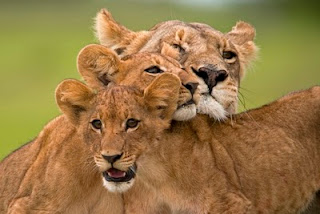The Last Lions. Written & directed by Dereck and Beverly Joubert.
Warning: this review contains spoilers. But the fact that a nature documentary can even contain spoilers is testament to how unique Dereck Joubert’s The Last Lions really is. It’s the best film I’ve seen that contains no actual human beings since the last Lord of the Rings movie.
The Jouberts, as National Geographic “Explorers in Residence,” spent eight years gathering their footage in Botswana’s Okavango Delta. The film documents the life of a solitary lioness they call Mau di Tau as she struggles to raise three cubs against enormous odds. Her pride (as in “her social group”) has been scattered by an invading cats; fleeing lion males who want to kill her young, and females with no decent intentions either, Mau di Tau lands on a quiet island that might offer some refuge. But then a herd of nasty water buffalo arrive, kicking off a blood struggle between feline guile and bovine stubbornness that is literally Homeric in its intensity—except that Homer wrote fables, and this is real.
Let’s dispose of your obvious objection: though at first glance this might seem like some kind of live-action Disney product, an Incredible Journey with wild critters, that is far from the truth. There is no Disneyesque sentimentality here. It is nature pitiless, red in tooth and claw. Some passages are heartrending in their emotional power: when, for instance, the mama is forced to abandon one of her cubs alive because the youngster ‘s back has been broken, I’d challenge the hardest-hearted of viewers to sit indifferent. Just the expression Joubert captures on the lioness’ face as she turns away is heartrending. Fair warning: though it offers its share of cuteness, this is not March of the Penguins with fur. Children under ten should not see it.
At a time when movie storytelling is seemingly becoming more and more of a virtual affair, The Last Lions is a reminder of what is possible with ingenuity, patience, and subject not made out of pixels. One could perhaps quibble over why the filmmakers chose to follow a solitary lioness when it’s their sociability that makes lions special in the first place. One could so object, but the Jouberts make up for it by demonstrating another, less-known fact—out there where it counts, there’s nothing soft and sentimental about being a mother. It’s perhaps the most cognitively demanding thing a mammal can do.
Is a certain amount of anthropomorphism necessary to tell and appreciate this story? No doubt—despite spending eight years in the bush, neither Jouberts nor we can know exactly what it feels like to be a lion. The more cynical amongst us will likely scoff when the narrator (thankfully not Morgan Freeman for once, but Jeremy Irons) speaks of Mau di Tau hatching “ideas” and concocting “hunting strategies.” But just as animals aren’t people, they aren’t machines either. More than likely they are closer to the former than the latter.
According to the Jouberts, the population of African lions has plunged from half a million to around 20,000 in just fifty years. This movie was so effective in depicting their plight that my cell phone came out to make a donation right as I left the theater (text “Lions” to 50555 to give ten bucks). There’s not much more anyone can say to recommend a “cause” movie than that.
© 2011 Nicholas Nicastro


A must see for me, thanks Nick.
ReplyDelete